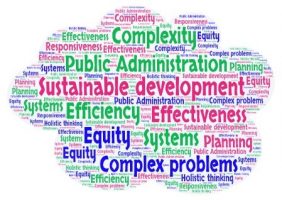Widgetized Section
Go to Admin » Appearance » Widgets » and move Gabfire Widget: Social into that MastheadOverlay zone
Facing the Complex Problems of Climate Change and Sustainable Development
The views expressed are those of the author and do not necessarily reflect the views of ASPA as an organization.
By John Duffy
June 8, 2018
 At its essence, the work of public administration involves addressing complex problems to improve society. Stated another way, the work of public administrators requires managing numerous interconnected systems for the benefit of the general public. It includes organizing government, developing and preparing policies to improve the public’s quality of life, and delivering services efficiently and effectively in addition to allocating resources in an equitable manner. Complex problems involve multiple, interconnected systems such as a city’s transportation, water distribution and economic systems. When making adjustments to one system to address an issue, changes may occur in other connected systems, oftentimes producing unintended consequences. For example, when adding road lanes to reduce traffic congestion, the added transport capacity improves access and travel times which in turn, increases adjacent land values. This increase in land values often results in new development which typically creates the unintended consequence of more traffic. As Rittel and Weber (1973) note, complex problems are never truly solved. Rather, they are moderated and must be addressed and readdressed again and again over time. Climate change—which affects our environmental, social and economic systems—is a complex problem facing public administrators throughout the world.
At its essence, the work of public administration involves addressing complex problems to improve society. Stated another way, the work of public administrators requires managing numerous interconnected systems for the benefit of the general public. It includes organizing government, developing and preparing policies to improve the public’s quality of life, and delivering services efficiently and effectively in addition to allocating resources in an equitable manner. Complex problems involve multiple, interconnected systems such as a city’s transportation, water distribution and economic systems. When making adjustments to one system to address an issue, changes may occur in other connected systems, oftentimes producing unintended consequences. For example, when adding road lanes to reduce traffic congestion, the added transport capacity improves access and travel times which in turn, increases adjacent land values. This increase in land values often results in new development which typically creates the unintended consequence of more traffic. As Rittel and Weber (1973) note, complex problems are never truly solved. Rather, they are moderated and must be addressed and readdressed again and again over time. Climate change—which affects our environmental, social and economic systems—is a complex problem facing public administrators throughout the world.
Sustainable development has been the recommended method for addressing climate change for over 30 years. While positive achievements have been made, much more needs to be accomplished. We, as public administrators, need to recognize that sustainable development is also a complex problem in order to effectively use this practice to moderate the negative aspects of climate change. Indeed, we must regularly remind ourselves that we are working with interconnected systems where modifications to one system usually leads to changes in other systems.
It is also important to remember that as public administrators, we are uniquely qualified to make progress towards achieving sustainable development because we routinely work on large, complex problems. This includes developing mitigation measures for extreme weather events such as flooding, ensuring clean water supplies for urban populations and developing energy efficient transportation systems for moving goods and people. In addition, as public administrators, we strive to achieve the following same six attributes common to sustainable development:
- efficiency,
- effectiveness,
- citizen equity,
- responsiveness,
- quality of life improvements, and
- quality planning.
When we implement projects that respond to the needs of our communities and invest in quality planning so that our resources are employed efficiently and effectively to improve the quality of life of our citizens, we are meeting the goals of sustainable development. Therefore, making sustainable development a priority does not require a paradigm shift because we should already be focused on similar goals. For example, when we seek to make the delivery of public services as efficient as possible (such as providing energy-efficient public transportation) or when we seek to make our programs more effective (such as providing policing that not only solves crimes but prevents them from occurring in the first place), our goals mirror those of sustainable development; namely, using resources efficiently and effectively.
To improve upon current practice, public administrators need to use a holistic perspective to better understand the interplay of various systems while also seeking to achieve the attributes of sustainable development. This includes, for example, making transport system improvements that reduce energy consumption while at the same time enhancing effectiveness and equity by reducing travel times and ensuring affordability to low-income users. We can also improve upon current practice by viewing sustainable development differently; namely, as a method of decision-making based upon an action plan for undertaking development that also considers potential effects on future generations. We can achieve significant progress towards sustainable development by combining a holistic perspective with a plan of action that incorporates the six attributes we already employ in the field of public administration; namely, efficiency, effectiveness, equity, responsiveness, quality of life improvements and quality planning. When we approach our daily work in this way, we are translating the theory of sustainability into the practice of sustainable development and as a result, we will make significant progress in meeting the challenges of the complex problem of climate change.
Author: John Duffy, PhD, CM, AICP, is currently an adjunct professor at the University of Alaska, Anchorage, College of Business and Public Policy; a visiting professor at the National University of Mongolia, School of International Relations and Public Administration; and Vice-President of the International Chapter of ASPA. He also worked in local government for over 30 years, and may be reached at [email protected]


Follow Us!